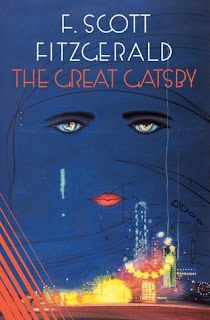The Great Gatsby
F Scott Fitzgerald
Many years ago, in high school, I got a list of 100 books every college-bound student should read. I read them, not for the purpose of boosting my college admission prospects, but because, with rare exceptions, they were VERY good books. F. Scott Fitzgerald's The Great Gatsby was one of those exceptions.
I do, in fact, have a vivid memory related to The Great Gatsby, and that is how quickly I forgot it. It was one of those books that one finishes with a feeling of relief, "Thank Gawd that's done!" (You ask, why did you keep reading if you didn't enjoy it? Well, I can't really say -- it's a long habit of mine. And it's not necessarily a bad one. The last few pages of a novel can completely change your feelings about it. Crime and Punishment was a long punishment to read, but the end made it worthwhile.) And then, even a week after finishing Gatsby, I had forgotten what it was about. I could not have told you who any of the characters were or anything that happened.
Jay and Daisy and Nick (just looked the names up in Wikipedia to write this review) were less real to me than the wizards and elves and hobbits of The Lord of the Rings. I mean, I understand the concept of fiction. I know that Gandalf and Frodo are in some sense less real than Jay Gatsby. But I can imagine myself into the heads of Gandalf and Frodo and even, with an effort, Elrond. I can imagine caring about the things they care about and wanting the things they want. I can't do that for Jay and Daisy and Nick. We all have limitations, and the inability to imagine myself into Jay Gatsby's head is one of mine.
This is obviously a personal reaction to The Great Gatsby that is not widely shared, or at least not widely expressed. If you love Gatsby, that is an equally valid reaction. "Equally" means no less valid, and no MORE.


Comments
Post a Comment
Add a comment!